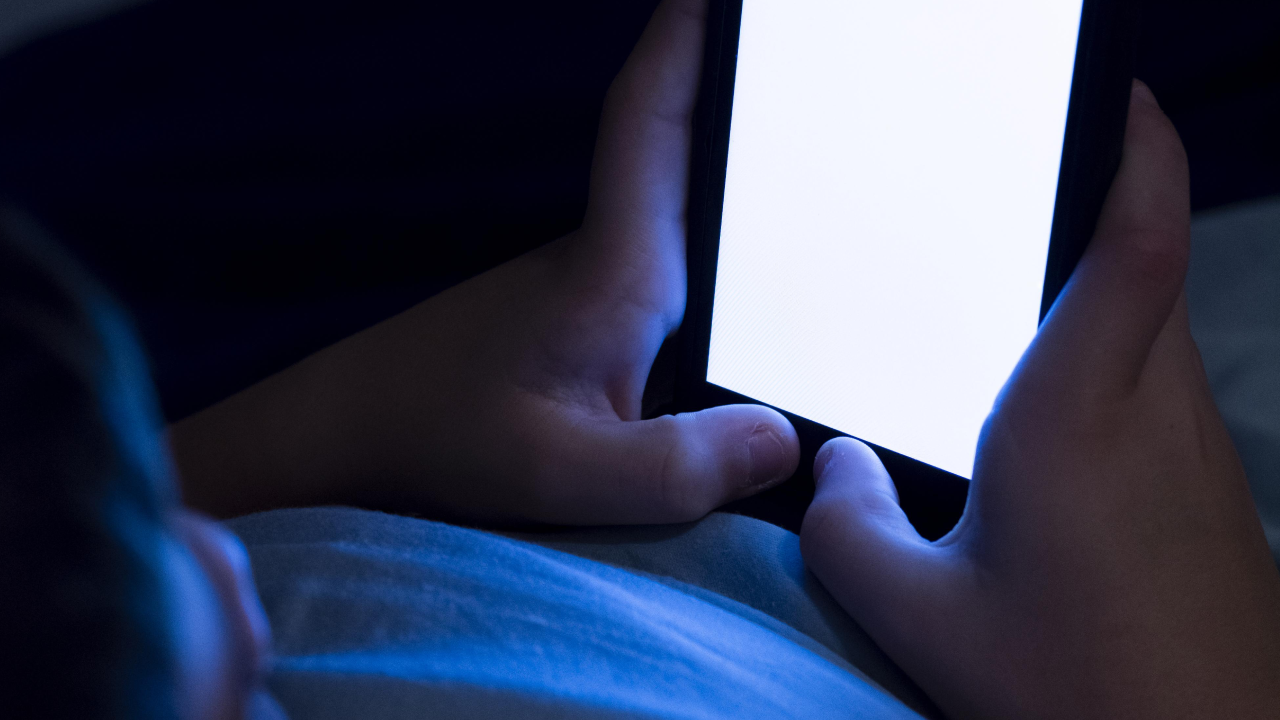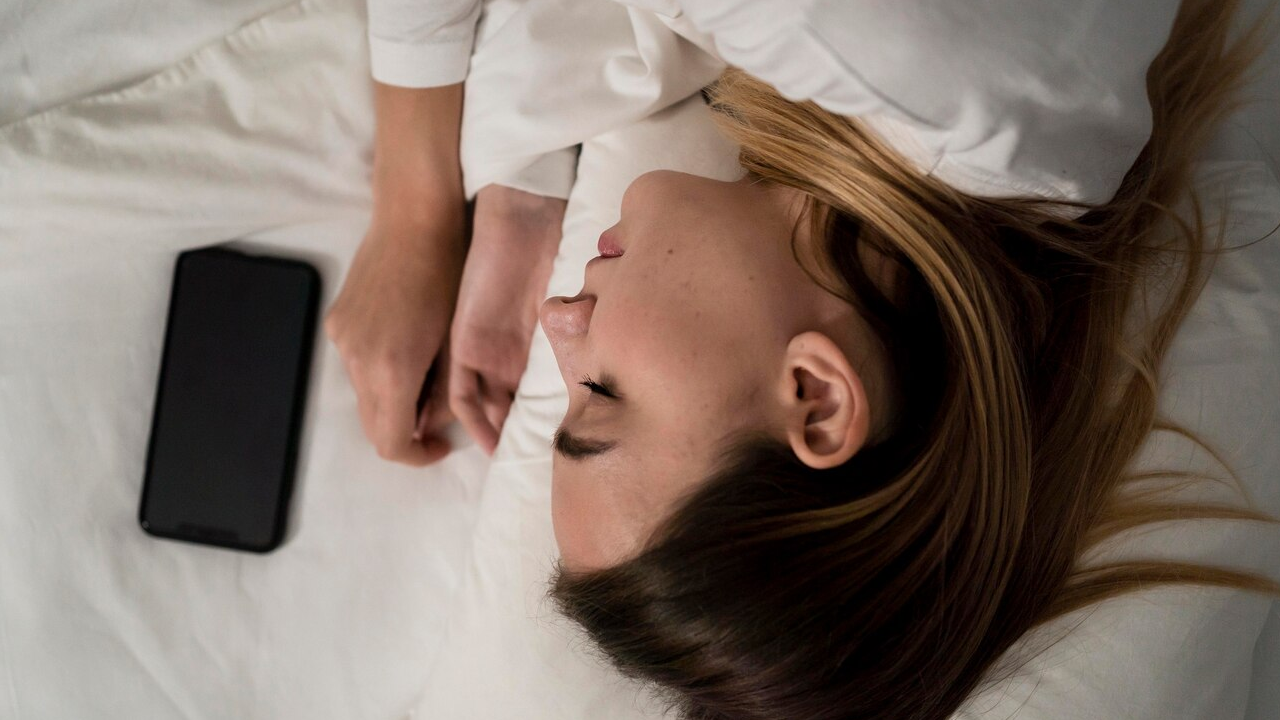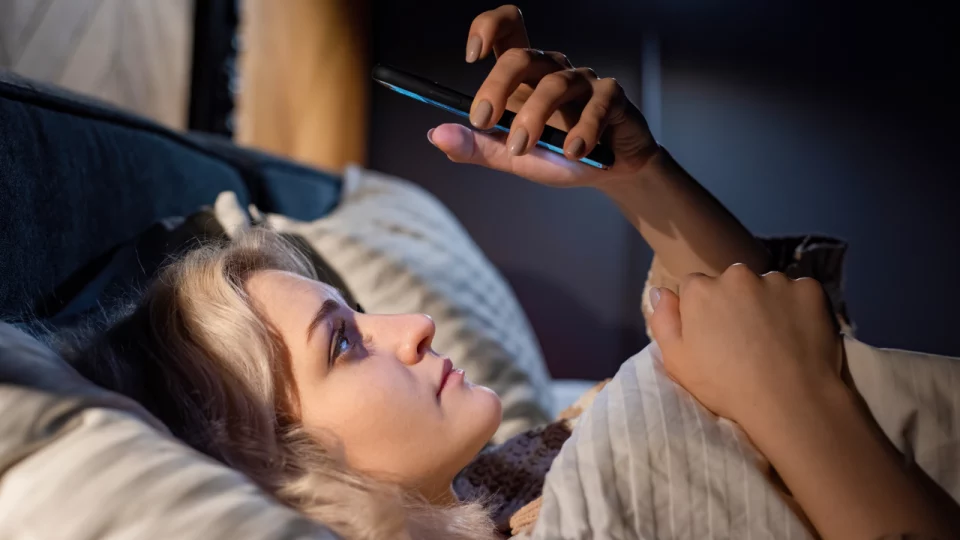In today’s digital age, many of us are attached to our screens, spending significant time on smartphones, tablets, and computers. It’s a common scene: after a long day, you crawl into bed and grab your phone for a few minutes of browsing, catching up on social media, or watching videos. But what seems like harmless scrolling before bed can actually disrupt sleep, potentially leaving you groggy and unrested. One of the key culprits often blamed for these issues is blue light.
But is it true that blue light from night-time scrolling can actually stop you from sleeping?
Table of Contents
Understanding Blue Light and Its Sources
Light is composed of a spectrum of colors, each with different wavelengths and energy levels. Blue light, a high-energy visible (HEV) light with wavelengths between approximately 400 to 495 nanometers, is naturally present in sunlight and is crucial for our well-being. When exposed to natural blue light during the day, our bodies receive cues that help regulate our circadian rhythms, boosting alertness, mood, and cognitive function.
However, blue light isn’t exclusive to sunlight; it’s also emitted by artificial sources like LED lights, screens on smartphones, computers, tablets, and TVs. Although the level of blue light from these devices is significantly lower than that of the sun, the close proximity and long exposure times can have unique effects on our bodies, particularly when used in the evening or before bed.
The Body’s Internal Clock: Circadian Rhythms and Melatonin
To understand the potential impact of blue light on sleep, it’s essential to grasp the role of circadian rhythms and melatonin. Our bodies operate on an internal clock that regulates various physiological processes over a roughly 24-hour cycle, known as the circadian rhythm. This rhythm influences when we feel awake, alert, or sleepy, and it plays a critical role in overall health and well-being.
One of the main components governing sleep within this rhythm is a hormone called melatonin. Produced by the pineal gland in the brain, melatonin helps signal to the body that it’s time to prepare for rest. Typically, melatonin levels rise in the evening as darkness falls, helping us feel sleepy and preparing the body for sleep. Exposure to light, particularly blue light, can suppress melatonin production, thus delaying sleep and reducing overall sleep quality.
How Does Blue Light Affect Melatonin Production?

Studies have shown that blue light has a strong influence on melatonin production. Photoreceptors in the retina, known as intrinsically photosensitive retinal ganglion cells (ipRGCs), are particularly sensitive to blue light. When blue light hits these receptors, it triggers a signal to the brain that it’s still daytime, thereby delaying the release of melatonin. As a result, people exposed to blue light at night may experience a delayed sleep onset, meaning they’ll take longer to fall asleep and may feel less rested upon waking.
A study published in the Journal of Clinical Endocrinology & Metabolism demonstrated that participants exposed to blue light for extended periods in the evening experienced significant delays in melatonin production compared to those exposed to dim light. These findings support the idea that blue light has a unique ability to disrupt the natural processes that help us wind down in preparation for rest.
The Role of Night-Time Scrolling in Sleep Disruption
So, how does night-time scrolling on smartphones or other screens play into this? For many, scrolling through social media, reading news articles, or even engaging in calming content has become a nightly ritual. While it may seem like a relaxing way to end the day, the blue light emitted from screens could be doing more harm than good. Here’s why:
- Close Proximity: When using a smartphone or tablet, the screen is typically held close to the face, increasing the intensity of blue light exposure compared to other sources of light in the room.
- Extended Exposure: Night-time scrolling often lasts for longer than a quick glance, sometimes stretching into half an hour or more. This extended exposure means the melatonin suppression effect is compounded, making it harder to fall asleep even after turning off the device.
- Mental Stimulation: In addition to the physical effects of blue light, engaging content on screens can stimulate the mind, making it even harder to wind down and transition to sleep. Social media, for example, can evoke a range of emotions, from excitement to frustration, which can hinder the relaxation process necessary for sleep.
- Altered Circadian Rhythm: With prolonged exposure to blue light late at night, the circadian rhythm may shift, leading to a delayed sleep phase. Over time, this shift can result in what’s known as “social jetlag,” where a person’s sleep cycle is misaligned with their daily responsibilities, leading to chronic sleep deprivation and daytime fatigue.
Does Reducing Blue Light Exposure at Night Help with Sleep?
Given the growing body of evidence linking blue light exposure to sleep disruption, many people have sought ways to mitigate its impact. Some common methods include:
- Blue Light Filters and Night Mode: Many devices now come with built-in blue light filters or “night mode” settings, which alter the screen’s color temperature to emit warmer tones and reduce blue light exposure. Studies have shown that using these features can lessen the impact on melatonin levels, although they may not entirely eliminate it.
- Specialized Glasses: Blue light-blocking glasses are designed to filter out blue wavelengths, making them popular among people who work late on screens or enjoy night-time reading. Research suggests that these glasses can reduce melatonin suppression, particularly for those who have to use screens for extended periods in the evening.
- Screen-Free Time Before Bed: Experts recommend limiting screen time at least one to two hours before bedtime to allow the body’s natural melatonin production to ramp up. During this time, individuals can engage in relaxing, screen-free activities like reading a physical book, meditating, or practicing mindfulness exercises to promote a smooth transition to sleep.
- Dim the Lights: Alongside reducing screen exposure, dimming ambient lighting in the evening can further aid melatonin production. Avoiding bright, overhead lights in favor of low-wattage lamps or warm-colored light sources can create an environment more conducive to winding down.
Beyond Blue Light: Other Factors Impacting Sleep

While blue light exposure is a notable factor in sleep disruption, it’s essential to recognize that it’s not the only one. Here are some other factors that can contribute to poor sleep:
- Mental Stimulation and Stress: The content viewed during night-time scrolling can have a psychological impact. Scrolling through news or engaging in emotionally charged content can heighten stress or anxiety levels, making it difficult to relax. Additionally, social media can prompt a “fear of missing out” (FOMO), which can increase feelings of stress or inadequacy, further affecting sleep.
- Engagement with Interactive Content: Unlike passive forms of entertainment like watching TV, scrolling through social media or reading online articles often requires active engagement. This activity keeps the brain alert and focused, making it more challenging to transition into a restful state.
- Electromagnetic Radiation and Sleep Patterns: Some researchers have suggested that the electromagnetic radiation emitted by devices could also interfere with sleep patterns. While the evidence on this topic is mixed, some individuals report improved sleep when devices are kept away from the bedside.
- Social and Lifestyle Habits: Late-night scrolling often correlates with certain lifestyle habits, such as irregular sleep schedules, caffeine consumption, and high levels of screen time during the day, all of which can impact sleep quality independently of blue light.
The Link Between Sleep Deprivation and Health
The consequences of poor sleep go far beyond feeling tired the next day. Chronic sleep deprivation has been linked to a variety of health issues, including:
- Impaired Cognitive Function: Lack of sleep affects focus, decision-making, and memory, reducing overall cognitive performance.
- Mood and Mental Health: Poor sleep is associated with mood disorders like depression and anxiety. Sleep deprivation can make it more difficult to regulate emotions and cope with stress.
- Immune System Suppression: Quality sleep supports a robust immune system, while chronic sleep loss can leave the body more susceptible to illness and infection.
- Metabolic and Cardiovascular Issues: Research has connected sleep deprivation to increased risks of metabolic disorders, including obesity and type 2 diabetes, as well as cardiovascular issues like hypertension.
Practical Steps for Better Sleep Hygiene in a Digital World
In today’s screen-centric society, eliminating blue light entirely may not be practical for everyone. However, adopting good sleep hygiene practices can make a significant difference. Here are a few actionable tips for better sleep in a digital world:
- Set a Digital Curfew: Try to establish a specific time to power down devices each night, ideally one to two hours before bedtime. This habit not only reduces blue light exposure but also helps the brain shift from active to rest mode.
- Create a Relaxing Evening Routine: Consider adopting calming pre-sleep routines, such as taking a warm bath, reading a book, practicing gentle yoga, or listening to soothing music.
- Optimize Your Sleep Environment: Make your bedroom as sleep-friendly as possible. Use blackout curtains, maintain a cool room temperature, and keep electronics out of the bedroom to minimize disruptions.
- Utilize Blue Light Filters: If avoiding screens entirely isn’t feasible, make use of night mode settings, blue light filters, or blue light-blocking glasses.
- Prioritize Daylight Exposure: Exposure to natural light during the day helps regulate the circadian rhythm, promoting alertness during waking hours and facilitating sleep at night.
